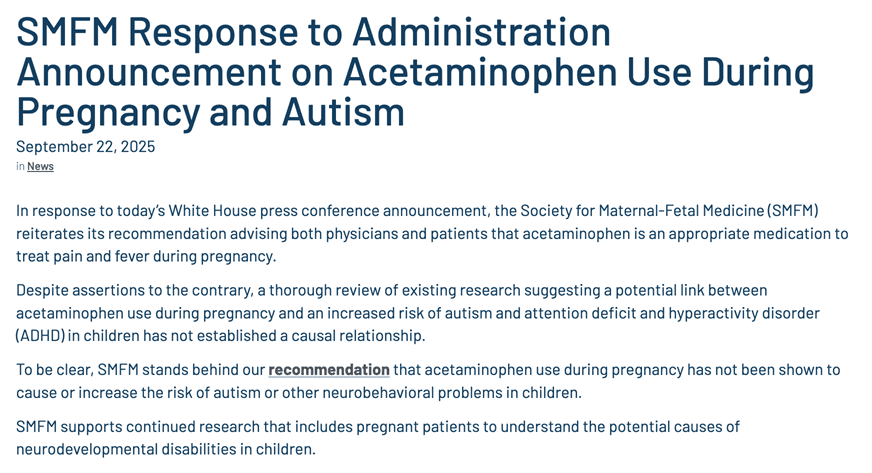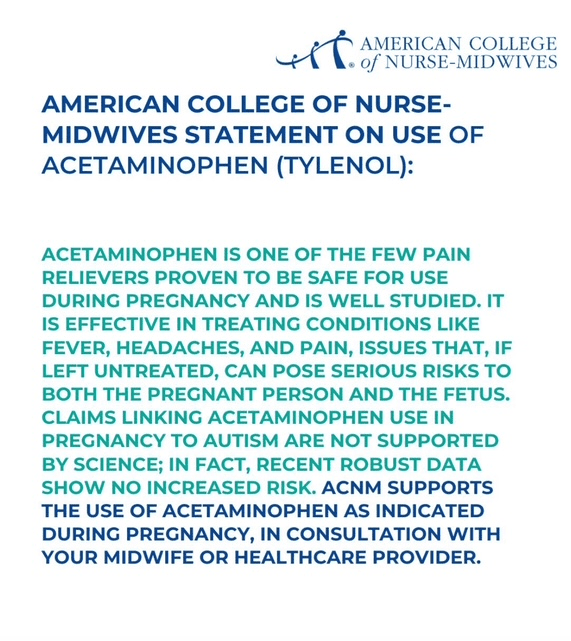Your safety and well-being remain our top priorities at Women’s Health Arizona. We recognize that recent media coverage about acetaminophen (Tylenol®) may have raised questions or concerns.
Our Clinical Position
Women’s Health Arizona adheres to current evidence-based guidelines from the American College of Obstetricians and Gynecologists (ACOG), the Society for Maternal-Fetal Medicine (SMFM), and the American College of Nurse-Midwives.
ACOG Affirms Safety and Benefits of Acetaminophen during Pregnancy
The following is a statement from Steven J. Fleischman, MD, MBA, FACOG, president of the American College of Obstetricians and Gynecologists (ACOG):
“Suggestions that acetaminophen use in pregnancy causes autism are not only highly concerning to clinicians but also irresponsible when considering the harmful and confusing message they send to pregnant patients, including those who may need to rely on this beneficial medicine during pregnancy.
“Today’s announcement by HHS is not backed by the full body of scientific evidence and dangerously simplifies the many and complex causes of neurologic challenges in children. It is highly unsettling that our federal health agencies are willing to make an announcement that will affect the health and well-being of millions of people without the backing of reliable data. “In more than two decades of research on the use of acetaminophen in pregnancy, not a single reputable study has successfully concluded that the use of acetaminophen in any trimester of pregnancy causes neurodevelopmental disorders in children. In fact, the two highest-quality studies on this subject—one of which was published in JAMA last year—found no significant associations between use of acetaminophen during pregnancy and children’s risk of autism, ADHD, or intellectual disability.
“The studies that are frequently pointed to as evidence of a causal relationship, including the latest systematic review released in August, include the same methodological limitations—for example, lack of a control for confounding factors or use of unreliable self-reported data—that are prevalent in the majority of studies on this topic.
“Acetaminophen is one of the few options available to pregnant patients to treat pain and fever, which can be harmful to pregnant people when left untreated. Maternal fever, headaches as an early sign of preeclampsia, and pain are all managed with the therapeutic use of acetaminophen, making acetaminophen essential to the people who need it. The conditions people use acetaminophen to treat during pregnancy are far more dangerous than any theoretical risks and can create severe morbidity and mortality for the pregnant person and the fetus.
“When considering the use of medication in pregnancy, it’s important to consider all potential risks along with any benefits. The data from numerous studies have shown that acetaminophen plays an important—and safe—role in the well-being of pregnant women.”


These guidelines continue to support acetaminophen as one of the safest options for pain relief and fever reduction during pregnancy when used appropriately.
ACOG’s current recommendations maintain that acetaminophen is an acceptable choice for managing pain and fever throughout pregnancy.
Individualized Care
Each patient’s medical situation is unique. We strongly encourage you to discuss any medication questions—including acetaminophen use—directly with your Women’s Health Arizona provider. This ensures your care plan is tailored specifically to your health profile and pregnancy needs.
Questions or Concerns?
If you have questions about acetaminophen or any other medications, please reach out to your provider’s office. Our team is ready to address your concerns and provide the guidance you need.
Your health and peace of mind matter to us, and we’re here to support you throughout your pregnancy journey.
